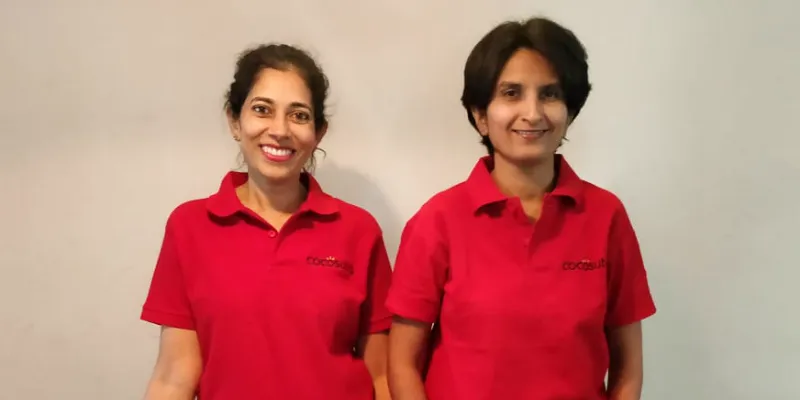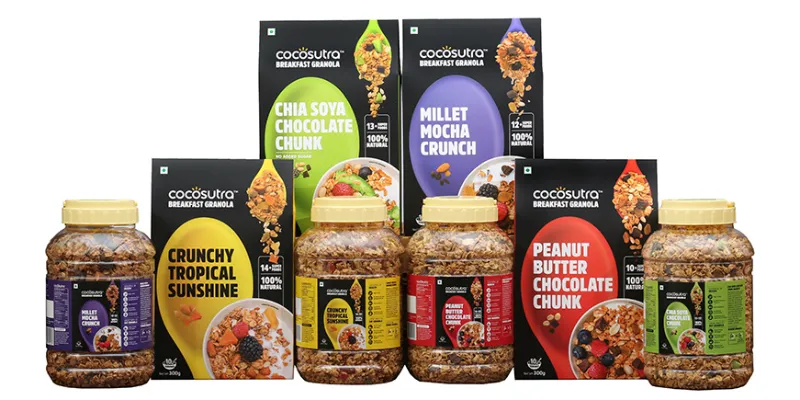Started by two techies, read how Cocosutra became the top rated breakfast granola on Amazon, Flipkart, and Bigbasket

Cocosutra co-founders Sheetal Swaroop (left) and Shilpa Kona (right)
Company: Cocosutra (a brand under Wild Child Enterprises)
Founders: Sheetal Swaroop and Shilpa Kona
Place: Bengaluru, Karnataka
Traditional Indian breakfast options are time-consuming to prepare. The preparation of batter for dishes such as idlis and dosas starts at least a day before they are cooked. The dough for other breakfast dishes such as parathas and chapatis is also prepared in advance. But with instant food options becoming popular, breakfast is becoming quick and easy to make.
Larger F&B companies have already placed their bets and ventured into instant foods such as cornflakes and other breakfast cereals. Small entrepreneurs are also entering this space. There seems to be a consensus that breakfast cereals are going to be the next big thing in this market.
When Bengaluru-based techies Sheetal Swaroop and Shilpa Kona wanted to become entrepreneurs, they decided they would target people who needed a nutritious breakfast but didn’t have time for an elaborate one. “We wanted to make ready-to-eat and quick-to-serve food products to target fitness/sports enthusiasts, working professionals, travellers, young couples, and families with young children,” says Sheetal.
To them, breakfast cereals made from granola seemed like the perfect product for this market. In 2017, the duo became full-time entrepreneurs when they launched Wild Child Enterprises in Bengaluru and started selling breakfast granola under the brand Cocosutra.
Making breakfasts healthy
The granola is made from oats, honey, nuts, seeds, fruit puree, and signature spice blends. These cereals are three parts whole grain and two parts dried fruits, nuts and seeds. The ingredients are mixed and slow roasted till they turn golden, and then they are topped with dried fruit. The consumer then mixes the cereal with chilled milk or curd.
“We launched Cocosutra as a gourmet food brand to make busy lives easy. The brand also sells hot chocolate blends, made with rich chocolate and cocoa, and frozen cookie doughs, which are pre-formed, and ready-to-bake,” says Shilpa. “Our frozen cookie dough is the first-of-its-kind in India.”
The bootstrapped company has now formed partnerships with various vendors in the supply chain. “We made partnerships with leading online marketplaces such as Amazon, Bigbasket and Flipkart, where our breakfast granolas have been the top rated in their category. We have also partnered with niche gourmet players such as Qtrove,” Sheetal says.

The Cocosutra breakfast granola range
Cocosutra is present in over 100 stores across India, including gourmet stores such as Foodhall and Le Marche in New Delhi and Gurgaon, Dorabjee’s in Pune; and Foodhall and Society Stores in Mumbai. “In Bengaluru, our products are available in over 50 stories stores including Foodhall, MK Retail, Loyal World Market, MK Ahmed, Nilgiris and organic stores,” she adds.
Cocosutra’s breakfast granolas also use no artificial flavours, preservatives, or colours. They are available in a multitude of flavours. They include peanut butter chocolate, millet mocha, chia soya, and chaat. They come in 300 gram packets costing Rs 300 and one kg jars costing Rs 1,000, but can be bought for discounted prices on ecommerce platforms.
The road ahead
For the young business, marketing these products under a new brand in the market consumes a lot of resources. Shilpa says that the challenge is compounded because building awareness about a new category like granola is not easy. “Having access to more finance can greatly ease this burden. A lot of time goes in payment collections. Therefore, we ensure that our trade partners are reliable,” she says.
In the near future, Cocosutra aims to boost its presence in gourmet and modern retail, ecommerce platforms, institutions and health/fitness centers. “We want to ensure as many people as possible taste our product. Proof of the pudding is in the taste!” Shilpa adds.
“Our dream is to be the go-to brand for ready-to-eat and quick-to-serve food products. Our current focus is the Bengaluru market. But we are seeking funding to have a wider presence pan India, launch more formats of existing products, and launch new products.,” Sheetal says.
However, the high GST of 18 percent on such products does not align with Cocosutra’s dreams of expansion. “We urge the government to help small companies and startups by lowering GST to five percent on such products till we hit a certain turnover. Paying 18 percent GST for a small business is a big burden,” she says.
Shilpa adds, “Large, multi-billion dollar companies pay 18 percent GST to the government and 15 percent margins to retailers. As a small company, we pay 30 percent margin to retailers and 18 percent to the government. We are left with next to nothing to grow.”
(This story is published in partnership with the MSME Ministry to showcase success stories of SMEs)
ALSO READ:
Prabodh Davkhare’s Nitrro Wellness wants to redefine India’s fitness mantra







